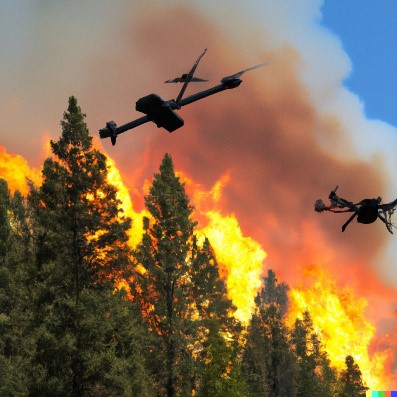- The Pompeu Fabra University and the University of California (UCI) are working on the creation of a new technological system that will allow a fleet of intelligent drones to be deployed in the event of a fire.
- The objective is for them to be able to work in a network and in a coordinated manner, to automatically carry out fire control and monitoring tasks.
- The research is carried out within the framework of the Chair promoted by Fractus to promote technology transfer and research in 6G wireless communication systems.
Barcelona, July 20, 2023 – The Pompeu Fabra University, within the framework of the Fractus-UPF Chair in Tech Transfer and 6G, and the University of California at Irvine (UCI) will create a new technological system to deploy intelligent drone networks that automatically carry out fire control and monitoring tasks. The project proposes solutions based on wireless communication technology (wireless) and artificial intelligence (AI) so that drones can work in a network and in a coordinated manner.
The research, recently started by both universities and which is expected to end in 2024, is developed within the Chair promoted by Fractus, which aims to promote technology transfer and research in 6G wireless communication systems.
The main researchers are Dr. Angel Lozano, director of the Wireless & Secure Communications research group of the Department of Information and Communication Technologies (DTIC) of Pompeu Fabra University and of the Fractus-UPF Chair; and Dr. Hamid Jafarkhani, professor of electronic engineering and computer science at UCI of California. Dr. Carles Diaz, a researcher in electronic engineering and computer science at the UCI, also participates in the research, among other collaborators. The project is also supported by the US National Science Foundation and the ICREA Academia program grant.

Overcome the technical limitations of current drones
The main challenge of the research is to automate the trajectories of the drones while they communicate with the command-and-control center and with the firefighters working on the ground. Precisely, the team is working to optimize the algorithms that determine the trajectory and automatic deployment of drones.
In this sense, Dr. Lozano (UPF) explains: “We are investigating how to overcome some of the current technical limitations of drones related to their energy consumption and their battery or recharging capacity, or looking for mechanisms that avoid their collision with other objects or suffer interference with other communication signals.
With this investigation, we also want to make it easier for the drones to provide information on the initial location of the fire and other data of a preventive nature, such as the inhabited areas or the nearby infrastructures closest to the source of the fire.
Smart drones in a context of climate change with increased risk of fire
The research wants to provide technological solutions to deal with the increasing risk of fire in the current context of climate change. In 2020 in California, the historical record for burned hectares was broken, more than 800,000 ha. according to official data as a result of the summer heat wave of that year.
In the case of Spain, this year the impact of the fires has intensified, even before the summer season. Between January and May 2023, 47,785 ha. have been burned due to forest fires, compared to 16,494 in the same period of 2022, according to the Ministry of Ecological Transition. The biggest fires have occurred in the provinces of Caceres, Asturias, Castellon and Lugo. Catalonia, for the moment, has not followed the upward trend of the State as a whole, although it did experience a strong increase in ha. burned in 2022 (5,834.66) 141% more than in 2021, according to data from the Generalitat of Catalonia.
The Fractus-UPF Chair in Tech Transfer and 6G was born in 2021 as a result of a collaboration agreement between the University and the technology company Fractus. Within the framework of this chair, research, transfer and training activities are organized on wireless technology and 6G systems, to improve the speed of data transmission and reduce energy consumption, as well as to seek specific connectivity solutions in the field of the Internet of Things (IoT). With this initiative, Fractus continues to bet on research by accelerating innovative technologies.
About Fractus
Fractus is an early pioneer in developing internal antennas for smartphones, tablets and other wireless Internet of Things devices and holds an intellectual property rights portfolio of more than 30 inventions protected through over 120 patents and patent applications in the United States, Europe and Asia. Among the numerous awards and honors the company has received for its innovative work, Fractus was named a 2005 Davos World Economic Forum Technology Pioneer and one of Red Herring’s top innovative companies for 2006. It also won the 2004 Frost & Sullivan Award for technological innovation and the 2010 National Communication Award of the Catalan Government in the telecommunications category. A team of Fractus inventors was finalist for the EPO European Inventor Award 2014. On November 2015, Fractus was awarded Academiae Dilecta by the Spanish Royal Engineering Academy and on April 2017 received the “European Inspiring Company Award” by the London Stock Exchange and the Elite Group.


 Merry Christmas and Happy New Year!
Merry Christmas and Happy New Year! 


